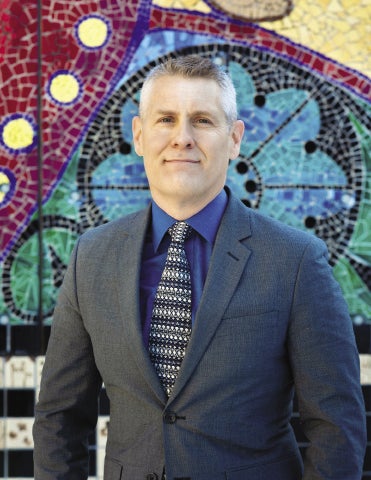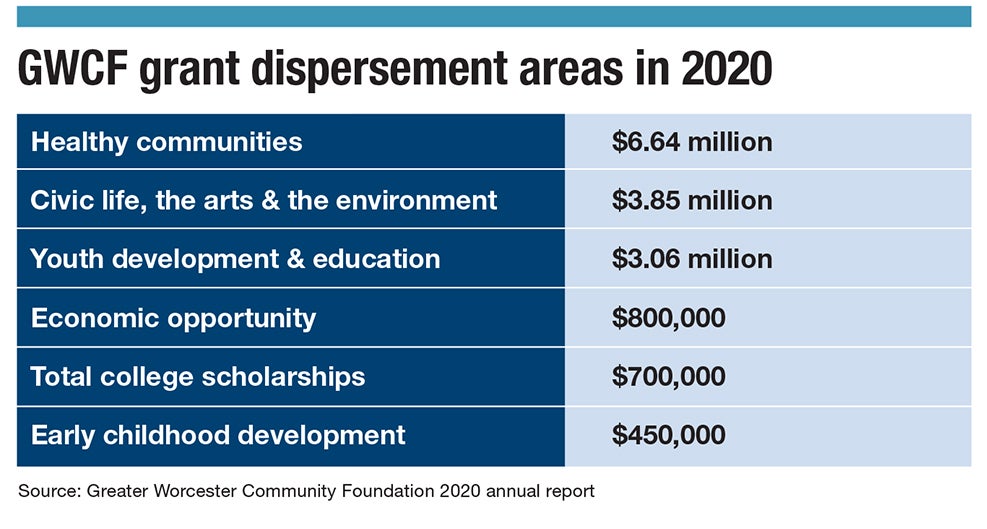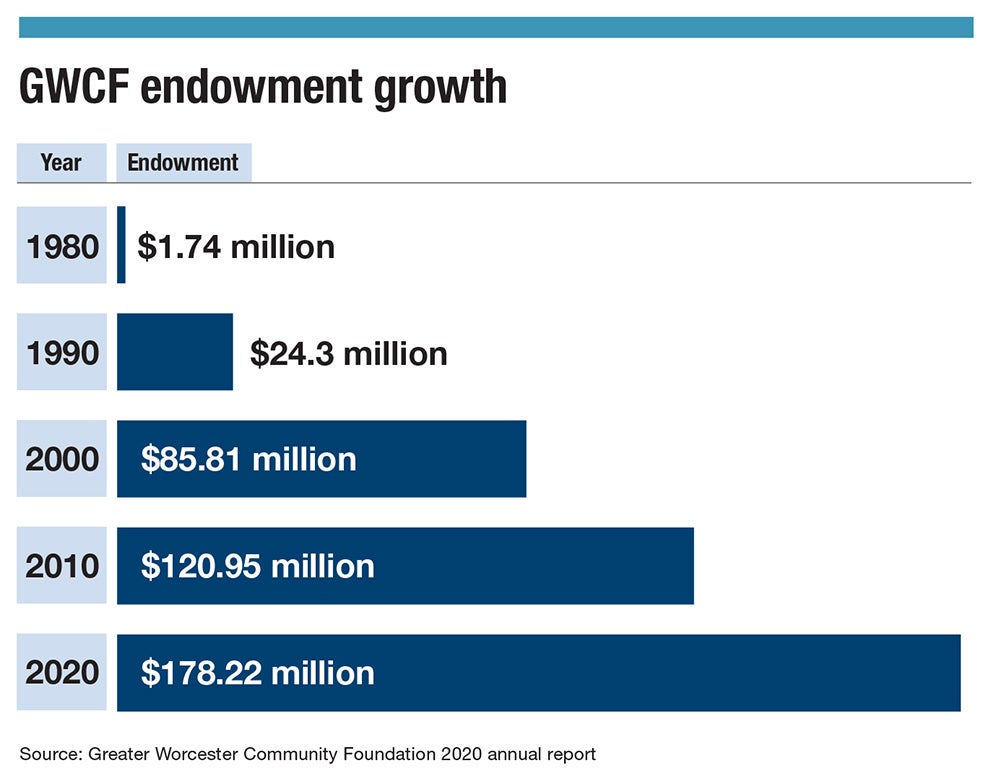Jim Ayres took the helm as CEO and president at the Greater Worcester Community Foundation at the start of the new year, replacing Barbara Fields, who resigned as head of the organization in March.
Get Instant Access to This Article
Subscribe to Worcester Business Journal and get immediate access to all of our subscriber-only content and much more.
- Critical Central Massachusetts business news updated daily.
- Immediate access to all subscriber-only content on our website.
- Bi-weekly print or digital editions of our award-winning publication.
- Special bonus issues like the WBJ Book of Lists.
- Exclusive ticket prize draws for our in-person events.
Click here to purchase a paywall bypass link for this article.
Jim Ayres took the helm as CEO and president at the Greater Worcester Community Foundation at the start of the new year, replacing Barbara Fields, who resigned as head of the organization in March after 19 months in the position. Ayres relocated to Worcester from Western Massachusetts, most recently serving as the founder and principal of the organizational development consulting practice Strategies for Collaborative Impact and Justice in Easthampton. Before that, he served as vice president for programs and strategy at Community Foundation of Western Massachusetts, and interim president and CEO of United Way of Pioneer Valley. He spoke with WBJ about what it is, exactly, that community foundations do, supporting equity at a time of rapid development, and his vision for how GWCF can further support the Greater Worcester community.

Can you tell me a bit about yourself and where you're from?
So, I originally grew up in Philadelphia, but have lived in Massachusetts for more than 30 years at this point. So more than half of my life has been spent here in Massachusetts, and I see it as my home. Most of that has been in Western Massachusetts, and I'm excited now to be here in Worcester and engaged in a deep level with this community.
You went to school in Massachusetts, exclusively, right?
Several times. I did. I did my undergraduate degree at Hampshire College, which is in Amherst. I earned an MBA with a nonprofit focus at UMass Amherst. And then I did an international affairs degree at Tufts University at The Fletcher School.
So, through all of those educational venues, what led you to working in the nonprofit and philanthropic spheres?
My career has really been almost all in the nonprofit sector. And I'd say the first half of that I spent in direct service organizations, so working in nonprofits directly working on challenges and opportunities from the community, including family service organizations, as well as leading an organization welcoming new immigrants and refugees. I really enjoy doing that work. I was always attracted to sort of macro level and system level organizations or issues.
So, in addition to doing those works, I served on a lot of statewide boards and committees doing policy work related to economic development, workforce development, and education. With that, I was excited to step over into the philanthropy and funding world, which really allows me to work on thinking about how you solve problems on a larger and more macro level. So I did that working with two different United Way organizations, and then most recently doing that work with the Community Foundation of Western Massachusetts, a neighboring community foundation doing that.

Is there any particular cause you've been drawn to more than others over the years?
The beauty of this work is getting to be a generalist, so getting to know lots of different needs in the community, getting to know a lot of different organizations and the different levers we can pull to try to create change. My expertise is related to family issues, economic development, and integrating refugee issues. But I really pride myself on having a deep understanding of a lot of issues that intersect.
Can you give a layman's explanation of what a community foundation is?
Community foundations are charitable foundations – so, we’re a private, nonprofit foundation raising resources we put to work to make our community the best place that it can be.
There’s two components making the foundations unique: one is our place-based focus, so we’re specifically focused on the city of Worcester and its surrounding communities. The other unique piece is the dollars we raise are not just from one family or one contribution, or one corporation, but rather, they come to us from donors all around the region.
A large percentage of the assets we have – and we have about $200 million – are assets focused on the long-term, if not invested in perpetuity. So, not only can we be responsive to short-term challenges when they come up, but we can be very focused on long-term strategies that may not pay off until years or decades down the road.
Could you point to an example of one of those long-term investments you don't see a return on right away?
In any community, one of the best places you can work toward is creating future opportunity. And our foundation believes and has done a lot of work around building opportunity through early childhood, giving families and children support early on so they're starting out in a place where they'll be able to find success down the line.
The other piece we’re very interested in, with a long-term focus, is the concept of equity. Worcester is in a really exciting place right now with a lot of opportunity, a lot of exciting things going forward, but if we're not careful, those opportunities are going to benefit those who are well-off and leave behind those who aren’t. We see it as our job to look at who has the potential of being left behind, who historically may have been underserved, and to try to adjust so opportunity is available for all.

Is there any project or part of the foundation you're particularly excited to work on and make your own as you take over leadership?
We’re doing a lot of work around the arts. So, supporting the creative sector in all of its different forms.
Are you a patron of the arts or an artist yourself?
I am a musician, not a particularly accomplished musician, but I play music, and I believe that vibrancy is an important part of community. So, our job at the foundation isn’t just to address critical needs, but to figure out how our communities can be as vibrant as possible to all the different people who live in the communities. And so within arts work here, equity is a big component, as well, to make sure artists from non-traditional backgrounds, artists of color, and low-income artists have the ability to be engaged, to make a living and share their gifts with the rest of the community.
Different parts of the community like to engage in arts in different ways, and we want to make sure there's opportunities for all of them, as well as opportunities to discover art forms and venues we might not come across in our own circles.
What should the business community know about you?
I’m a new person to the community, and I’m thrilled to be sitting here, in Worcester. But I’m going to need to learn the community. I’m going to need to get to know more people. I’m going to need to reach out. And I’m so excited to do that with business leaders.
I’m excited to do both from the perspective of them as employers, and their perspective as being key stakeholders who are committed to this community. It’s been really exciting to see, just in my first few weeks of living here, how engaged so many companies are and how interested they are in this concept of working together.
This interview was conducted and edited for length and clarity by WBJ Senior Staff Writer Monica Benevides.
